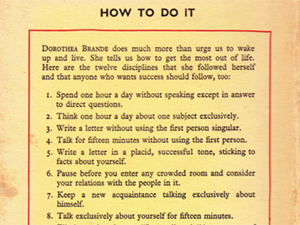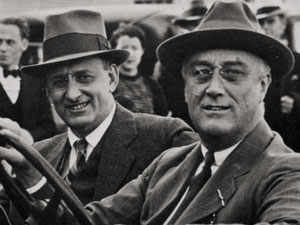
How the Streets Honor Martin Luther King Jr. How the Streets Honor Martin Luther King Jr.
On city walls across the country, muralists and street artists depict him as a statesman, visionary, hero and martyr.
Aug 14, 2013 / Books & the Arts / Camilo José Vergara

Fascist Sympathies: On Dorothea Brande Fascist Sympathies: On Dorothea Brande
Wake Up and Live! reveals the connection between the radical individualism of 1930s self-help manuals and fascist politics.
Aug 13, 2013 / Books & the Arts / Joanna Scutts

This Week in ‘Nation’ History: Hiroshima and the Roots of American Secrecy This Week in ‘Nation’ History: Hiroshima and the Roots of American Secrecy
The bombing of Hiroshima changed everything; but it may not be too late to change it back.
Aug 3, 2013 / Books & the Arts / Katrina vanden Heuvel

The Gore Vidal FBI File The Gore Vidal FBI File
The first page, from 1960s, says Vidal made disparaging remarks about J. Edgar Hoover.
Jul 29, 2013 / Jon Wiener

Political Dreaming in the Twenty-First Century Political Dreaming in the Twenty-First Century
Where has it gone?
Jul 25, 2013 / Ira Chernus

FDR’s Jewish Problem FDR’s Jewish Problem
How did a president beloved by Jews come to be regarded as an anti-Semite who refused to save them from the Nazis?
Jul 17, 2013 / Books & the Arts / Laurence Zuckerman

Surveillance Blowback Surveillance Blowback
The making of the US surveillance state, 1898–2020.
Jul 16, 2013 / Alfred W. McCoy
This Week in ‘Nation’ History: The Fourth of July and the Meaning of Patriotism This Week in ‘Nation’ History: The Fourth of July and the Meaning of Patriotism
In our first issue, just after the Civil War, we wrote that in 89 years of celebrating the Fourth of July, never before did Americans have more to rejoice about on Independence Day...
Jul 4, 2013 / Books & the Arts / Katrina vanden Heuvel

How the Powerful Derail Accountability: The Case of Intelligence Reform (Part II) How the Powerful Derail Accountability: The Case of Intelligence Reform (Part II)
When momentum gathered to reign in the national security state in 1976, the powers that be struck back with a distraction campaign that worked.
Jul 2, 2013 / Rick Perlstein

Rage and Ruin: On the Black Panthers Rage and Ruin: On the Black Panthers
A new history of the party is too close to its subject, and misses the human drama.
Jun 5, 2013 / Books & the Arts / Steve Wasserman
